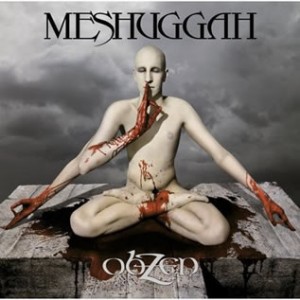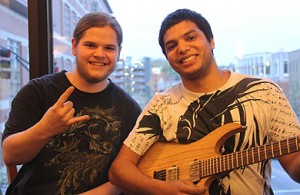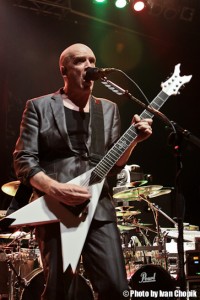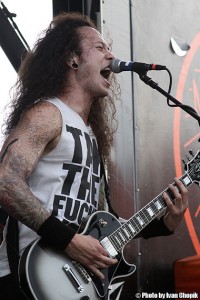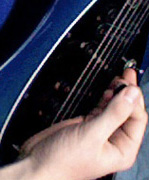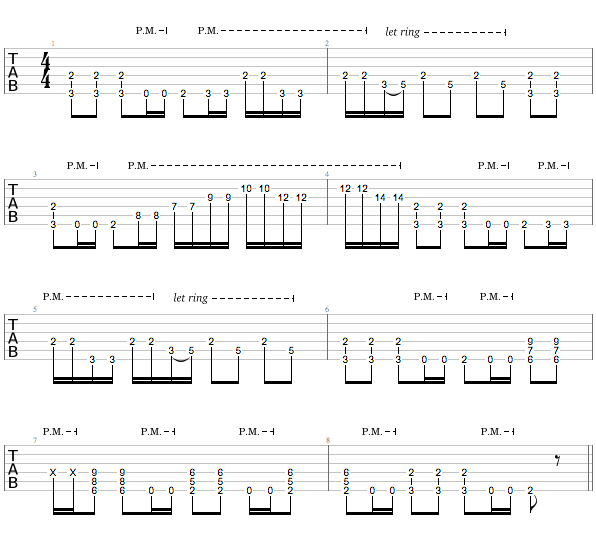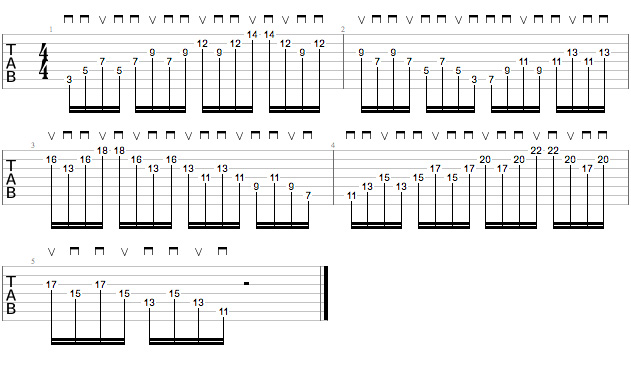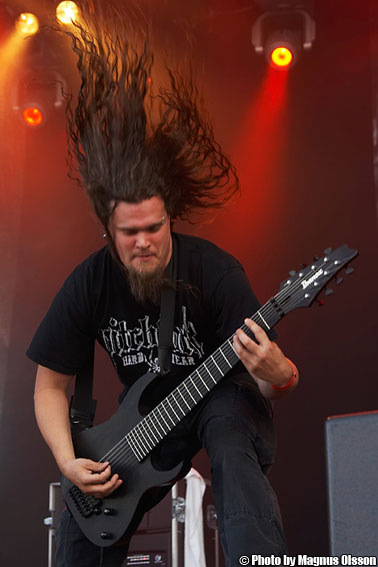 Meshuggah is a band that truly stands in a musical category of its own. Over the past two decades, the Swedish experimental metal group has forged a unique and instantly identifiable sound. Meshuggah’s intricate polyrhythms, low-tuned 8-string guitars, and grinding grooves have played an important role in influencing numerous other artists – especially those coming up in the new generation of heavy metal. Always pushing the limits of extreme music, their latest album obZen is no exception, proving to be one of the band’s most vicious and inspired releases yet.
Meshuggah is a band that truly stands in a musical category of its own. Over the past two decades, the Swedish experimental metal group has forged a unique and instantly identifiable sound. Meshuggah’s intricate polyrhythms, low-tuned 8-string guitars, and grinding grooves have played an important role in influencing numerous other artists – especially those coming up in the new generation of heavy metal. Always pushing the limits of extreme music, their latest album obZen is no exception, proving to be one of the band’s most vicious and inspired releases yet.
I recently had the chance to speak with one of Meshuggah’s two axe-slingers, Mårten Hagström, at the 10th annual New England Metal & Hardcore Festival in Worcester, Massachusetts:
IC: How’s the North American tour in support of obZen going?
MH: The tour’s been excellent so far. We’re five and a half weeks into it right now, and we’ve got two more to go. It’s been excellent. It’s been running smoothly. We’ve been having good shows, good turnout – so we’re happy.
IC: I heard you had some trouble in the beginning of the tour.
MH: What happened was that we flew into Seattle, and for our first show we went to Spokane. Then we had a long drive up to Calgary, and when we were trying to cross into Canada we had some problems with papers and shit like that. We got stuck at the border for quite a long time, so we actually didn’t make it to the Calgary show. So that was a bummer, but apart from that it’s been really smooth.
IC: Let’s talk a little about obZen. What inspired the name of the album?
MH: Oh, yeah. To keep it short, it’s a cross between two words. It’s a cross between obscene and Zen. The basic meaning, without writing anything on somebody’s nose, is the general concept of how it seems like humanity or society itself today is coming into its own – finding its inner peace and moments of Zen from greed and bloodshed and pretty much acting stupid.
IC: Meshuggah has been getting significantly more media attention and gaining new fans with the latest release. What do you think sets obZen apart from the last couple of albums?
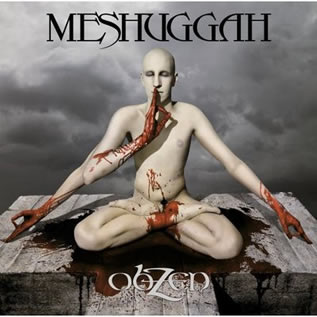 MH: For me, that’s a real tough one to answer, because of the obvious fact that I’m not 100% sure why people are into a certain record at all. You never know. We’re always experimental in one way or another, trying to come up with shit we find cool. In reality, since we’ve gone back for the first time in a bunch of years to a regular song structure and having the songs be a bit more direct and with a little bit more aggression back in it – I think just going back to that format makes it more accessible than it used to be for a long time. And maybe people have adjusted to us, as well. Through the years, people have been saying ‘Oh, that’s kind of an oddball band.’ But people are slowly getting used to that, I guess (laughs).
MH: For me, that’s a real tough one to answer, because of the obvious fact that I’m not 100% sure why people are into a certain record at all. You never know. We’re always experimental in one way or another, trying to come up with shit we find cool. In reality, since we’ve gone back for the first time in a bunch of years to a regular song structure and having the songs be a bit more direct and with a little bit more aggression back in it – I think just going back to that format makes it more accessible than it used to be for a long time. And maybe people have adjusted to us, as well. Through the years, people have been saying ‘Oh, that’s kind of an oddball band.’ But people are slowly getting used to that, I guess (laughs).
IC: You started out with a strong thrash influence, and arrived at a more groove-based technical sound that we’ve come to know as Meshuggah. Having been on this path for the last three or four of albums, where do you see your sound going from here on out? Where would you like to take it?
MH: As far as I where I see it going, I have no clue. I don’t think any of us have a clue. Because, in all honesty, whenever you’re finished with an album and look back on it – it’s a very rare thing that you had a preconceived notion of what it was going to be. So whatever’s going to happen next is going to be whatever we’re gonna feel like after coming off of touring for this album. Because that’s what always happens. We go back home, we take a break, and then things just fall into place. We’re pretty rigid with our sound. We tweak our sound a little bit, but we’re within our own bubble – we produce and write our stuff. It’s just a matter of what kind of mindset we’re gonna be in at the time. I couldn’t read the title of it, though.
IC: What’s the typical writing process like?
MH: If you’re talking about Chaosphere, it was done in a different way, but the general way is that you come up with an idea – ‘Oh, cool thing. We should go do something like that.’ You hear it in your head and you sit down and record it on the computer and program drums and stuff like that. The cool thing is that kind of makes it so that we’re so into the whole process, that you never really lift your head. So we really are one of those bands – we never jam on tour or write stuff on tour. It’s at home. When we’re at home and working together, we just bury ourselves in our little bubble, in our studio – and that’s it.
IC: Do you guys jam the songs out back home?
MH: No. Sometimes we work together in the studio, sometimes at home – sending it back and forth. What we mainly do, is produce demos for each other. So let’s say I have three songs and six, seven parts laying around, and Fredrik’s [Thordendal – Guitars] got two songs with a couple parts, and whatever… you feed off each other.
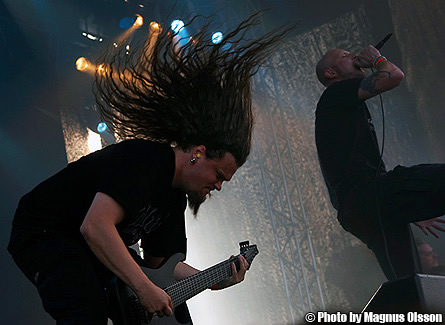 You do something that you’re psyched about, and the other guy’s getting psyched up about it, and you’re psyched up about what they’re doing, so you’re feeding off each other – which is a really good spot to be in when you’re trying to create.
You do something that you’re psyched about, and the other guy’s getting psyched up about it, and you’re psyched up about what they’re doing, so you’re feeding off each other – which is a really good spot to be in when you’re trying to create.
IC: How do you approach all the polyrhythms in your music? I’ve actually sat down and tried to count out some of those overlying patterns – they’re outrageous. Do you approach them separately?
MH: Ninety percent of the time I approach it the way you would when playing a blues. Because everybody knows the blues and it’s a natural motion of something, but it’s fairly set down so everybody can just pick it up. The thing is, I try not to think of it as rhythmic figures that start there and then stop, and then start again. It’s how the figure sounds different, and works in a different way and moves as far as how it’s grooving towards the 4/4 – that’s everything. Some parts are difficult to learn, especially if you didn’t write them yourself. They might not come as natural to you, so in the learning process you might break it down into numbers so you can get a view of what’s actually down there, as far as what you’re gonna do. But the way the music sounds to you is how it moves through the 4/4.
IC: Does it take you a while to get adjusted to some of the riffs that the other members come up with?
MH: Yeah, it’s always harder to do that, because you tend to write natural for yourself, first and foremost. But we’ve grown together so much that you can kind of anticipate the type of stuff that’s gonna come out of the other guy, so I guess it’s not that hard. But it’s definitely two processes: one of assimilating and adjusting to the material, and then actually just letting it sit naturally in the back of your spine. You just go with it.
IC: You guys have been doing this for a while. It was 1987 when you guys started, right?
MH: Yeah, the garage demos and stuff was late 80’s – ’89, or something like that. We’ve known each other for a long time. The first release was in ’91, I believe. I would say when Tomas [Haake – Drums] started was in ’90, that’s when everything really started to work as a band.
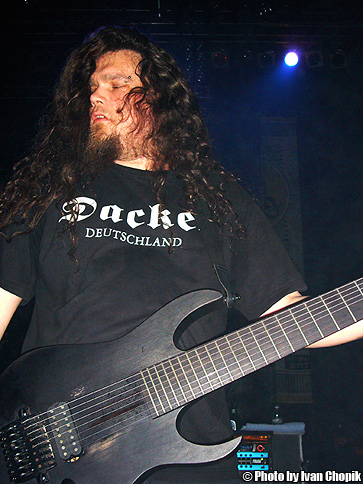 IC: What have been some high points and low points throughout your career?
IC: What have been some high points and low points throughout your career?
MH: Low points: well, there’s always a bunch of low points in a career that’s this long. We’ve had our share of bad luck, especially back in the day – cut off fingers and shit like that. Fredrik cut his finger off and had to sew it back on [points to his left ring finger]; Tomas split his finger once… We’ve been having some accidents, man, involving hands. Peter, our first bass player, got sick and had to leave the band – the regular stuff you go through in your career, but it’s kind of a bum-out when it happens. High points: whenever you release an album and feel satisfied with it. Getting to tour with Tool – that was a great tour, we had a lot of fun. It was great being out with Slayer. We’ve been lucky with tours, man. So touring’s gotta be the high point, I think.
IC: Some of the original bands that you were influenced by now claim to be influenced by you – like Metallica, for example.
MH: Yeah, Metallica – those guys were the shit when we were growing up. I still have tremendous respect for them, and still play the old albums. It’s hard to even bother about stuff like that. Because, ok – somebody likes your stuff; that’s great, period. Whoever it is doesn’t really matter. But it’s cool, it’s just something that’s kinda weird when you think about it – we try not to. So we just do our stuff.
IC: How do you feel about newer bands that take influence from Meshuggah and are trying to take the sound that you’ve created in another direction?
MH: I don’t know. I guess it’s a good thing. When you start playing music in a band – ask any musician – everybody’s got someone who kind of lights their spark as far as creativity goes. When you get those epiphanies from some band, (like when you hear Rush for the first time, or Metallica, it’s like ‘Wow! This is fucking cool! This is something that I want to work with’) it’s a great feeling, because you know you’re giving something back to someone. So I guess it’s all good.
IC: I want to talk a little bit about the gear you use live and on obZen. Did you use your Line6 amps on this record?
MH: Yeah. We basically plug straight in to the Line 6 and use the cab that we mic, and then we get the simulator to fade in by just plugging straight in – so we have two signals.
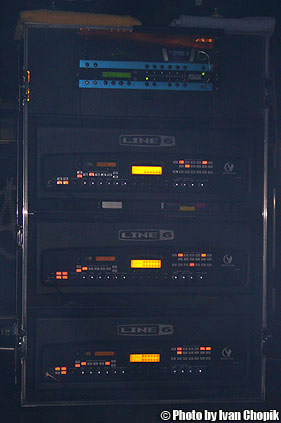
Mårten’s Live Rig
When actually got around to record, we really early on realized that we would not be able to use the mic’ed sound, because the cabinets were crapping out whenever we went to the really low stuff with palm muting. It actually worked out better to just do it from the straight signal, you know? But it’s been Line 6 for most of the time.
IC: Have you ever considered the tube amp route, or are you happy with the modeling technology?
MH: We’re happy. We’re looking for new ways to improve the tone. We’re looking into some stuff now – we’re just about to mess around with it, but we’re not sure how that’s gonna pan out. I mean, we’ve been using the Vetta II’s both live and in the studio for a long time now. As far as today, Line 6 is fine for us.
IC: What do you like to do in your off-time at home, when you’re not playing music? I hear you’re an avid hockey fan.
MH: I am a big hockey fan. I do a little bit of whatever, man, because I try to relax when I’m not working. I’ve got a big old house, so I got a lot of work cut out there. I do that a lot, I just try to kick back – I watch a lot of hockey, play a lot of video games.
IC: Do you play hockey yourself?
MH: I used to. I played when I was a kid, but then music started taking over. You know, that town is crazy – we produced like 24 NHL pros over the years. It’s a town of like 55,000, so it’s insane. Hockey’s like a religion there. My dad used to play.
IC: What are you listening to these days?
MH: We listen to weird shit. We listen to a lot of electronica stuff like Squarepusher, Aphex Twin. I love everything Mike Patton’s put out: Mr. Bungle, Tomahawk, Fantômas – stuff like that is really fuckin’ excellent. I still listen to some old Entombed stuff. Strapping Young Lad was a great band. There’s bands around that are good, they pop up every once in a while. It’s hard to answer the question because we’ve been working for two years on an album. We rarely listened to music at that point. So basically we’ve been out of touch with the music scene for like a year and a half, at least. Now, coming on tour, we actually get to listen to new stuff, which is kind of exciting.
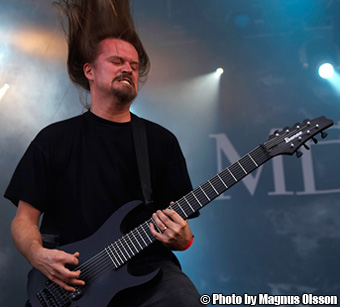
Fredrik Thorendal
IC: You seem to be the voice of the band, so to speak. There aren’t too many interviews with Fredrik or the other guys in the band, and when they’re involved, they’re not particularly active.
MH: Jens does one of a hundred interviews, and Tomas and me pretty much split up the rest.
IC: Fredrik’s not into that?
MH: No, he’s never been. Since we just happened to start to do this back in the day, we’re more accustomed to it. So it’s one of those things.
IC: Do you have any advice for upcoming musicians?
MH: I actually don’t do too many exercises. There’s an inherent trap – you’ve gotta practice, everybody knows that, and that’s a good thing. You should always practice more, it seems. But sometimes institutionalized music… When you’re actually reading music, it seems to me that sometimes you’re so stuck in actually trying to get your tools in gear, that you’re forgetting about actually making something with the tools, you know what I’m saying? So keep that in mind.
Special thanks to Chris Dingman for the transcription of this interview.



